Diplomatic Bluebook 2022
Chapter 4
Japan's Diplomacy Open to the Public
2 Strengthening the Foreign Policy Implementation Structure
As Japan faces drastic changes in the power balance of the international community, the rapid development of an ever more severe and uncertain security environment surrounding Japan, and the increasingly fluid international situation caused by the global spread of COVID-19, MOFA must enhance its foreign policy implementation structure while also looking ahead to the post-COVID-19 world, in order to vigorously advance diplomacy for maintaining and developing an international order based on universal values. To that end, MOFA is strengthening both the quantity and quality of its diplomatic missions overseas, and reinforcing the organizational and personnel structures at its headquarters. In addition, as human resources are a key asset to diplomacy, and as distribution of limited resources in terms of personnel, budget and time must be focused on diplomatic activities that can only be carried out by staff members, MOFA is promoting digitalization, work efficiency and productivity, in line with the priority areas to be reinforced over the next five years.
Diplomatic missions overseas, such as embassies and consulates-general, not only represent Japan, demonstrate its presence and engage in diplomatic activities, but also play a key role in areas such as information-gathering and strategic communication at the frontline of diplomacy. At the same time, overseas missions also carry out operations directly related to enhancing the interests of Japanese nationals, such as protecting their lives and safety, providing support for Japanese companies, promoting investment and tourism, and securing energy and other resources. In response to COVID-19, overseas missions disseminate relevant information to a broad group of Japanese abroad in a timely and appropriate manner through their websites, e-mails and other mediums, such as Travel Advice and Warning on Infectious Diseases, country and region-specific infection situations, and restrictions on entry and movement.
In January 2022, Japan established a consulate-general in Da Nang in Viet Nam. As a result, the number of diplomatic missions overseas as of FY2021 is 230 (153 embassies, 67 consulates-general and 10 permanent missions). Da Nang is achieving remarkable economic growth, and the numbers of Japanese companies in operation and Japanese nationals living there are both increasing. Additionally, Da Nang occupies an important position on the security front facing the South China Sea. Since it is situated at the starting point of the East-West Economic Corridor, Da Nang is recognized as one of the important strategic locations toward realizing “Free and Open Indo-Pacific (FOIP)” Japan will deepen its relations with the Da Nang region in a multi-layered manner by establishing a base for information gathering on security and economic affairs in the area.
In FY2022, Japan will establish a new embassy in Kiribati. As a key junction in the South Pacific, Kiribati has an exclusive economic zone (EEZ) that is the largest among Pacific Island countries and the 12th largest in the world. Deepening Japan-Kiribati cooperative relations is essential for the realization of FOIP. Furthermore, Kiribati is an important partner that has often supported Japan's position at international fora. It is vital that Japan establish an embassy there to continue maintaining and strengthening the favorable bilateral relationship and enhancing the system for more effective gathering of various information and provision of assistance in emergency situations.
In addition to establishing more diplomatic missions overseas, it is important to secure and increase the number of staff members to support diplomacy at the MOFA headquarters and diplomatic missions overseas. In the context of the Government's policy to reduce the overall personnel expenses due to the current severe budget situation, the number of staff members at MOFA was increased to 6,430 in FY2021 (6,358 in FY2020) in order to address bilateral relations and regional situations, advance Japan's Proactive Contribution to Peace policy, conduct strategic communications, promote economic diplomacy, contribute to addressing global issues, and implement protection and safety measures for Japanese nationals abroad. The number of staff members, however, remains insufficient in comparison with other major countries. MOFA continues its efforts to build a structure that is commensurate with Japan's national power and diplomatic policy. In the meantime, based on the belief that enhancing the foreign policy implementation structure remains essential in FY2022, MOFA will increase its workforce by 74 staff.
MOFA appropriated 709.7 billion yen in the budget for FY2021 (of which 13.8 billion yen related to digital is appropriated in the budget of the Cabinet Secretariat and later the Digital Agency) in order to overcome COVID-19 and advance “diplomacy with robustness and a sense of caring.” In addition, MOFA appropriated 146.4 billion yen in the supplementary budget for FY2021 (of which 4.1 billion yen is appropriated in the Digital Agency budget). The funding appropriated in the budget included contribution to the COVAX Facility's Advance Market Commitment (AMC). Accordingly, Japan pledged 800 million US dollars at the COVAX AMC Summit in June. Furthermore, MOFA appropriated funding mainly to support developing countries in Asia, Oceania, the Middle East, Africa and other regions in order to prevent the spread of COVID-19 and improve their humanitarian situation, and for supporting the overseas expansion of Japanese companies.
MOFA's FY2022 initial government budget proposal appropriated 707.4 billion yen (of which a digital-related budget of 17.0 billion yen is appropriated in the Digital Agency budget) based on the following priorities: (1) overcoming COVID-19 and leading the response to infectious diseases; (2) promoting human security and demonstrating leadership in addressing global issues; (3) collaborating with like-minded ally and partners in defending universal values in the international community; (4) cementing understanding and trust in Japan using an array of diplomatic tools; and (5) further strengthening the foreign policy and consular service implementation structure by promoting digitalization. The budget included appropriations for leading the response to infectious diseases, including COVID-19, and for demonstrating leadership in addressing global issues, such as climate change. Furthermore, MOFA appropriated a budget for realizing FOIP, including strengthening collaboration with like-minded allies and partners and strategically using ODA in order to defend universal values, such as fundamental human rights. Additionally, MOFA appropriated a budget for strengthening the foreign policy and consular service implementation structure, including enhancing strategic communications and promoting digitalization.
In order to promote Japan's national interests, Japan will continue to proceed strategically to develop the foreign policy implementation structure and enhance it further, while making efforts to streamline operations.
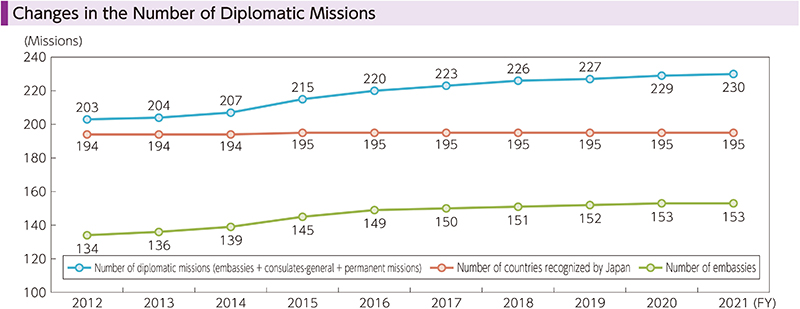
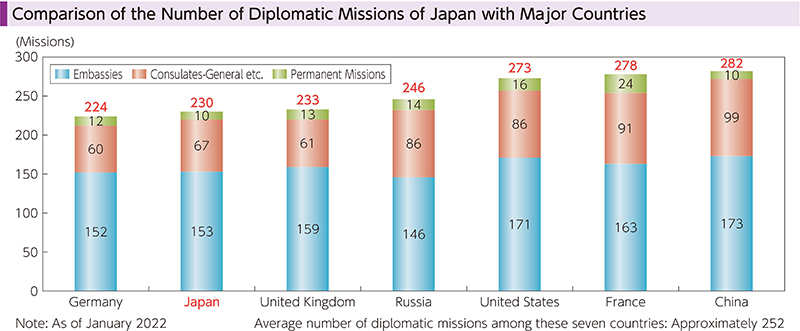

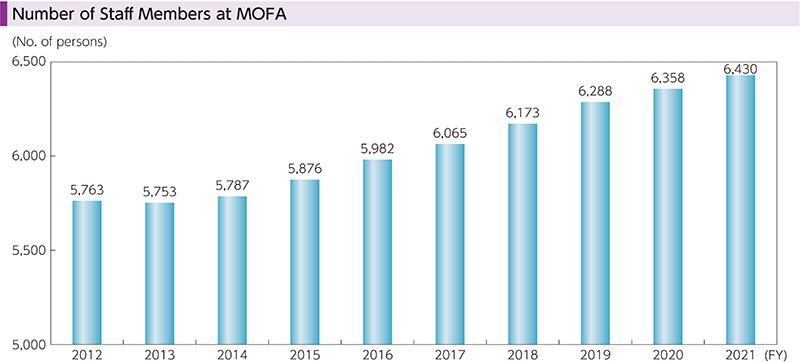
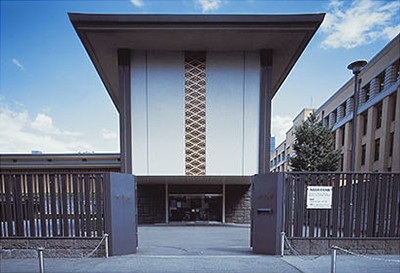 Front entrance of the Diplomatic Archives
Front entrance of the Diplomatic ArchivesThe Diplomatic Archives is a facility of MOFA for preserving, publishing, compiling and displaying historically important materials. It was founded on April 15, 1971, and celebrated its 50th anniversary in 2021.
MOFA has always been aware of the importance of referring to past negotiations and precedents. In 1870, a year after the ministry was established, a bureau was set up to manage documents, and ever since, MOFA has placed an emphasis on classifying and preserving diplomatic records. Ishii Kikujiro who once served as Foreign Minister said “Whether documentation is complete or not determines final success in foreign policy.” Those words symbolize the ministry's stance of attaching importance to documents, in that the management of documents can even influence the outcomes of diplomacy. Additionally, following World War I, the U.S. and European countries embarked on making the background to diplomatic events available to the public, including by publishing compilations of diplomatic documents, and MOFA likewise began disclosing diplomatic documents. The first such volume was published in 1936, and MOFA carries on the work of compiling the Documents on Japanese Foreign Policy (Nihongaikobunsho) up to the present day.
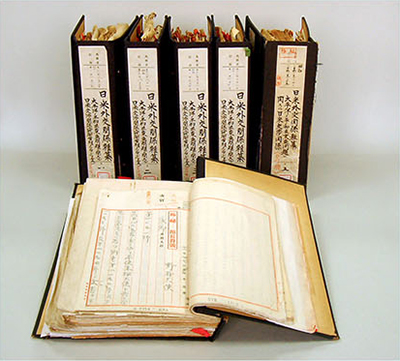 MOFA records concerning Japan-U.S. negotiations just prior to the start of the Pacific War (The Archives holds over 100,000 files of this kind).
MOFA records concerning Japan-U.S. negotiations just prior to the start of the Pacific War (The Archives holds over 100,000 files of this kind).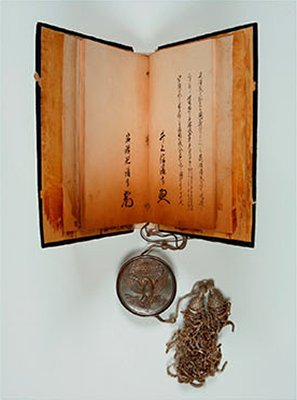 The Treaty of Amity and Commerce between Japan and the United States (an Important Cultural Property), which was concluded at the end of the Tokugawa Shogunate.
The Treaty of Amity and Commerce between Japan and the United States (an Important Cultural Property), which was concluded at the end of the Tokugawa Shogunate.With this foundation of managing and publishing documents, and amid the growth in interest in the historical facts of Japan's foreign policy after the end of World War II, the Diplomatic Archives was opened in 1971 as a facility for providing access to historical documents from the pre-war era that had been kept in MOFA. Subsequently, from 1976 MOFA began disclosing post-war diplomatic records as a voluntary initiative, and furthermore, in May 2010 the transfer and disclosure of post-war diplomatic records were advanced significantly, as a result of an independent MOFA rule stipulating that records created or received more than 30 years ago will in principle be made available to the public. When the Diplomatic Archives was initially established, it held only about 50,000 files from the end of the Tokugawa Shogunate through to the pre-war Showa Period, but the number of files now exceeds 110,000. The historical documents held at the Archives range from the Treaty of Amity and Commerce between Japan and the United States, which was signed in 1858, to records of post-war diplomatic negotiations, such as negotiations relating to the reversion of Okinawa and the normalization of diplomatic relations between Japan and China. The custody of records of more recent periods is also being steadily transferred to the Diplomatic Archives, which is making them available to the public. The Public Records and Archives Management Act (enforced in April 2011) positions public documents as “an intellectual resource to be shared by the people in supporting the basis of sound democracy” and makes it mandatory for the historical documents held in the Diplomatic Archives to be preserved in perpetuity. At the Archives, steady efforts have been made on a daily basis to arrange documents, control their environment and restore them in order to preserve the common property. The historical documents that have been passed down present the journey of Japan's foreign policy, and serve as material to understand Japan's history.
The Diplomatic Archives has been making much effort not only to preserve historical documents, but also to promote their active utilization. The Archives provide access to a broad range of historical facts through the Reading Room's reference support, publishing the series of “Documents on Japanese Foreign Policy,” holding exhibits of precious historical documents, and making documents available on the Internet in response to the demands of the times. Making large amounts of highly reliable historical documents available to the public and verifying historical facts are important also in terms of encouraging an amicable resolution to issues of the recognition of history. Diplomatic documents are very important in nurturing Japanese history and building a future of international goodwill. The Diplomatic Archives will continue endeavoring to make its facilities available to as many people as possible.
Diplomatic Archives
5-3, 1-chome, Azabudai, Minato Ward, Tokyo, 106-0041 Japan
Opening hours: 10 a.m. to 5:30 p.m.
(Excludes Saturdays, Sundays, national holidays, Year-end and New Year Holidays (December 28 to January 4), and days on which the Diplomatic Archives announces that it will be temporarily closed. (The opening hours could be changed due to the situation of COVID-19. We may recommend checking the latest information on our website or by telephone.))
https://www.mofa.go.jp/about/hq/record/index.html


